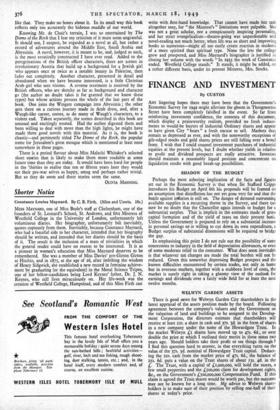FINANCE AND INVESTMENT
By CUSTOS ANY lingering hopes there may have been that the Government's Economic Survey for 1949 might alleviate the gloom in Throgmorton Street have been completely falsified in the event. So far from reinforcing investment confidence, the contents of this document, which display a praiseworthy realism, provided no fresh induce- ments to would-be buyers of industrial Ordinary shares and appear to have given City " bears " a fresh excuse to sell. Markets thus remain as depressed as ever, and with the noteworthy exceptions of gilt-edged stocks and gold shares prices are still falling over a broad. front. I wish that I could counsel investment purchases of industrial equities at the present levels, but I doubt whether yields in relation to profit and dividend prospects are really attractive. Investors should maintain a reasonably liquid position and concentrate on liquidation stocks with good break-up possibilities.
SHADOW OF THE BUDGET Perhaps the most sobering implication of the facts and figures set out in the Economic Survey is that when Sir Stafford Cripps introduces his Budget on April 6th his proposals will be framed on an assumption that disinflation has not yet gone very far and that the battle against inflation is still on. The danger of demand outrunning available supplies is a recurring theme in the Survey, and there can now be no doubt that the Chancellor again intends to budget for a substantial surplus. That is implicit in the estimates made of gross capital formation and of the yield of taxes on their present basis. Unless the Government is prepared to rely on a substantial increase in personal savings or. is willing to cut down its own expenditure, a Budget surplus of substantial dimensions will be required to bridge the gap.
In emphasising this point I do not rule out the possibility of some concessions to industry in the field of depreciation allowances, or even of some moderate relief to the consumer. What does seem inevitable is that whatever tax changes are made the total burden will not be reduced. Given this somewhat depressing Budget prospect and the known difficulties encountered by certain trades, not only in home but in overseas markets, together with a stubborn level of costs, the market is surely right in taking a gloomy view of the outlook for earnings and dividends over a fairly wide field for at least the next twelve months.
WELWYN GARDEN ASSETS
There is good news for Welwyn Garden City shareholders in the latest appraisal of the assets position made by the board. Following agreement between the company's valuers and the Government on the valuation of land and buildings to be assigned to the Develop- ment Corporation, the directors estimate that shareholders will receive at least 22s. a share in cash and 37s. 3d. in the form of shares in a new company under the name of the Howardgate Trust. In the market Welwyn Li shares have moved up to 47s. 6d., or over double the price at which I outlined their merits in these notes two years ago. Should holders take their profit or see things through ? I find this question hard to answer, in that everything turns on the value. of the 37s. 3d. nominal of Howardgate Trust capital. Deduct- ing the 22s. cash from the market price of 47s. 6d., the balance of 25s. 6d. puts a value on the Trust shares of about 13s. 4d. in the L. The Trust, with a capital of £1,000,000, will hold the stores, a few small properties and the L500,000 claim for development rights, &c., on the Government's L300,000,000 Compensation Fund. If this claim is agreed the Trust shares would be worth par, but the outcome may not be known for a long time. My advice to Welwyn share- holders is to make sure of their position by selling one-half of their shares at today's price.






































 Previous page
Previous page